Analysis of a Mental Health Care Plan: A Case Study Approach
VerifiedAdded on 2021/02/21
|12
|3189
|328
Case Study
AI Summary
This case study examines a mental health care plan centered around a patient named Peter, diagnosed with bipolar disorder and exhibiting paranoid tendencies, substance abuse, and suicidal ideation. The report delves into four key issues within mental health social work: the role of policies and legislation, the application of AASW (Australian Association of Social Workers) code of ethics and values, and the development of a mental health care plan. It details Peter's history, including forensic involvement, family history, and current challenges, such as financial difficulties and accommodation issues. The care plan outlines treatment goals, including illness management through medication and cognitive interventions, functional goals focusing on social support, and financial stability. The case study highlights the importance of the recovery approach, emphasizing person-centered care and the integration of recovery-oriented practices. It underscores the significance of ethical considerations, professional standards, and the crucial role of social workers in mental health care.
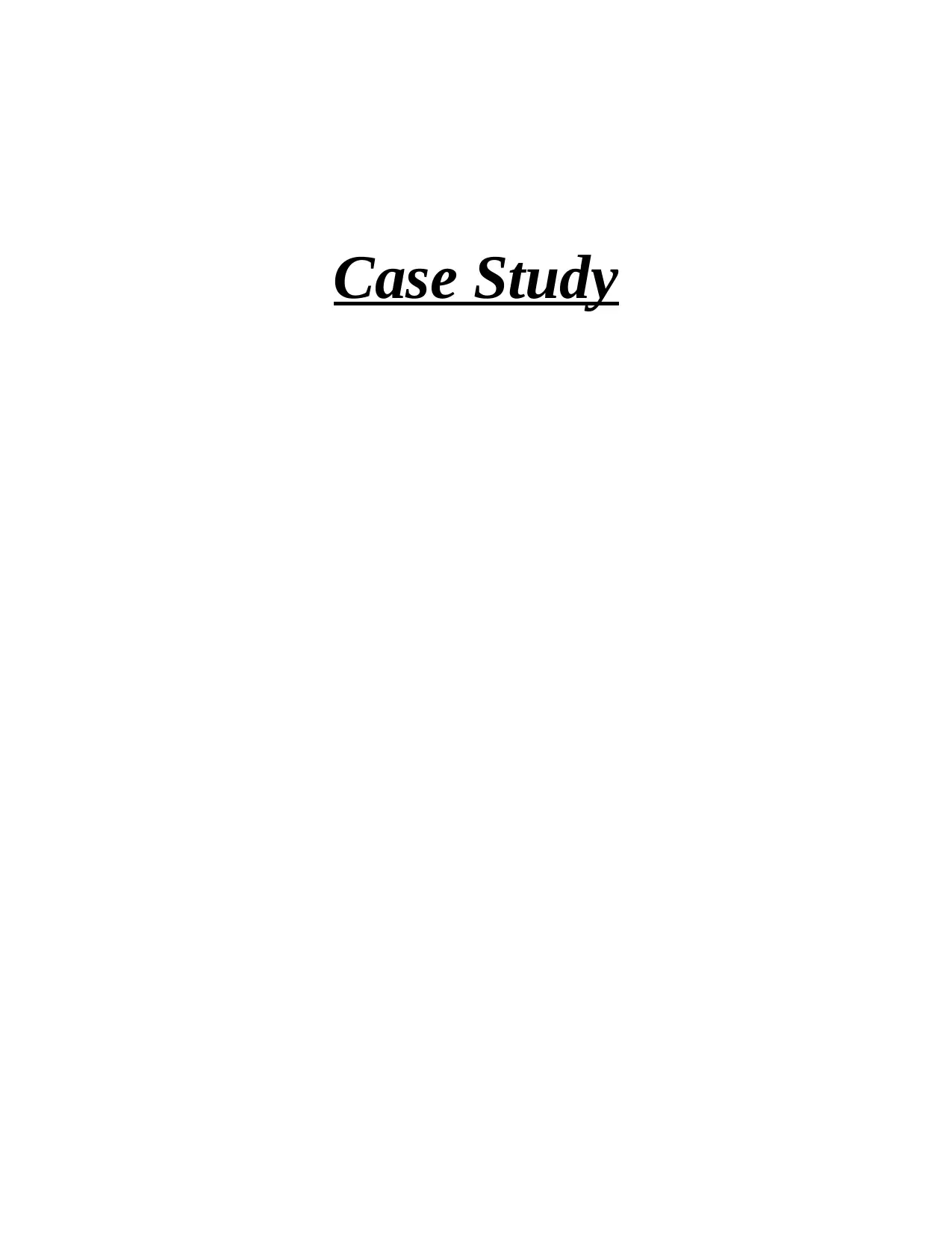
Case Study
Paraphrase This Document
Need a fresh take? Get an instant paraphrase of this document with our AI Paraphraser
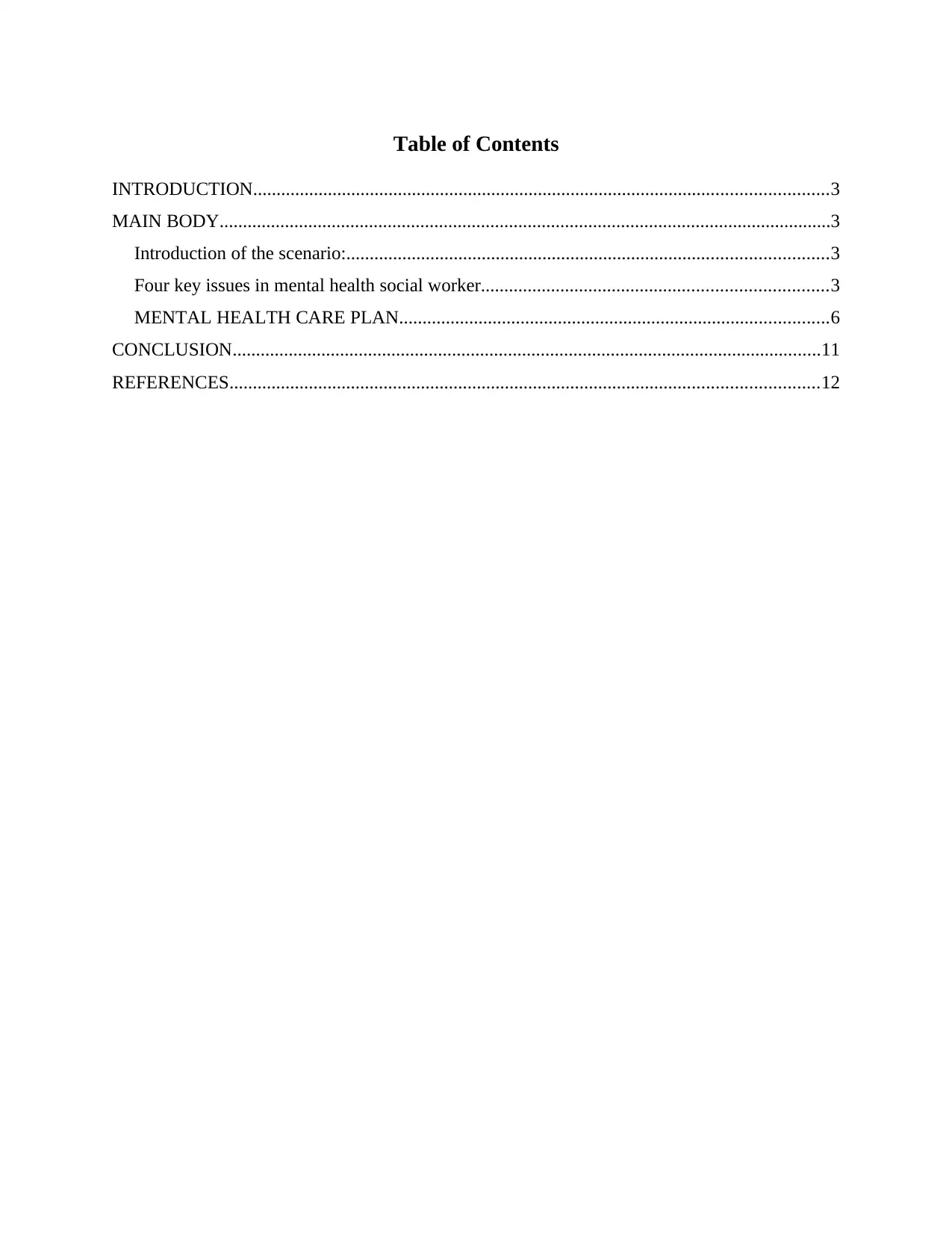
Table of Contents
INTRODUCTION...........................................................................................................................3
MAIN BODY...................................................................................................................................3
Introduction of the scenario:.......................................................................................................3
Four key issues in mental health social worker..........................................................................3
MENTAL HEALTH CARE PLAN............................................................................................6
CONCLUSION..............................................................................................................................11
REFERENCES..............................................................................................................................12
INTRODUCTION...........................................................................................................................3
MAIN BODY...................................................................................................................................3
Introduction of the scenario:.......................................................................................................3
Four key issues in mental health social worker..........................................................................3
MENTAL HEALTH CARE PLAN............................................................................................6
CONCLUSION..............................................................................................................................11
REFERENCES..............................................................................................................................12
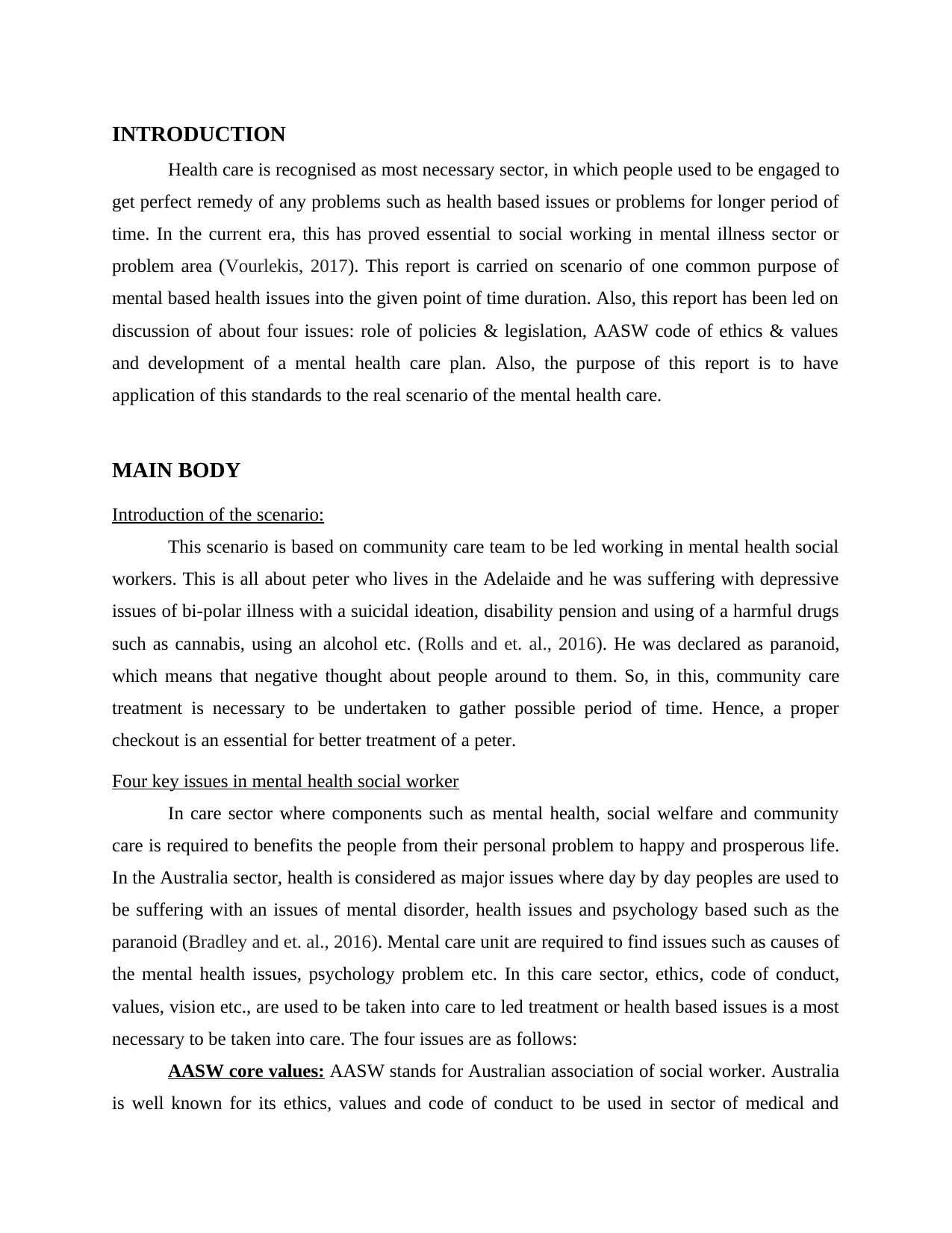
INTRODUCTION
Health care is recognised as most necessary sector, in which people used to be engaged to
get perfect remedy of any problems such as health based issues or problems for longer period of
time. In the current era, this has proved essential to social working in mental illness sector or
problem area (Vourlekis, 2017). This report is carried on scenario of one common purpose of
mental based health issues into the given point of time duration. Also, this report has been led on
discussion of about four issues: role of policies & legislation, AASW code of ethics & values
and development of a mental health care plan. Also, the purpose of this report is to have
application of this standards to the real scenario of the mental health care.
MAIN BODY
Introduction of the scenario:
This scenario is based on community care team to be led working in mental health social
workers. This is all about peter who lives in the Adelaide and he was suffering with depressive
issues of bi-polar illness with a suicidal ideation, disability pension and using of a harmful drugs
such as cannabis, using an alcohol etc. (Rolls and et. al., 2016). He was declared as paranoid,
which means that negative thought about people around to them. So, in this, community care
treatment is necessary to be undertaken to gather possible period of time. Hence, a proper
checkout is an essential for better treatment of a peter.
Four key issues in mental health social worker
In care sector where components such as mental health, social welfare and community
care is required to benefits the people from their personal problem to happy and prosperous life.
In the Australia sector, health is considered as major issues where day by day peoples are used to
be suffering with an issues of mental disorder, health issues and psychology based such as the
paranoid (Bradley and et. al., 2016). Mental care unit are required to find issues such as causes of
the mental health issues, psychology problem etc. In this care sector, ethics, code of conduct,
values, vision etc., are used to be taken into care to led treatment or health based issues is a most
necessary to be taken into care. The four issues are as follows:
AASW core values: AASW stands for Australian association of social worker. Australia
is well known for its ethics, values and code of conduct to be used in sector of medical and
Health care is recognised as most necessary sector, in which people used to be engaged to
get perfect remedy of any problems such as health based issues or problems for longer period of
time. In the current era, this has proved essential to social working in mental illness sector or
problem area (Vourlekis, 2017). This report is carried on scenario of one common purpose of
mental based health issues into the given point of time duration. Also, this report has been led on
discussion of about four issues: role of policies & legislation, AASW code of ethics & values
and development of a mental health care plan. Also, the purpose of this report is to have
application of this standards to the real scenario of the mental health care.
MAIN BODY
Introduction of the scenario:
This scenario is based on community care team to be led working in mental health social
workers. This is all about peter who lives in the Adelaide and he was suffering with depressive
issues of bi-polar illness with a suicidal ideation, disability pension and using of a harmful drugs
such as cannabis, using an alcohol etc. (Rolls and et. al., 2016). He was declared as paranoid,
which means that negative thought about people around to them. So, in this, community care
treatment is necessary to be undertaken to gather possible period of time. Hence, a proper
checkout is an essential for better treatment of a peter.
Four key issues in mental health social worker
In care sector where components such as mental health, social welfare and community
care is required to benefits the people from their personal problem to happy and prosperous life.
In the Australia sector, health is considered as major issues where day by day peoples are used to
be suffering with an issues of mental disorder, health issues and psychology based such as the
paranoid (Bradley and et. al., 2016). Mental care unit are required to find issues such as causes of
the mental health issues, psychology problem etc. In this care sector, ethics, code of conduct,
values, vision etc., are used to be taken into care to led treatment or health based issues is a most
necessary to be taken into care. The four issues are as follows:
AASW core values: AASW stands for Australian association of social worker. Australia
is well known for its ethics, values and code of conduct to be used in sector of medical and
⊘ This is a preview!⊘
Do you want full access?
Subscribe today to unlock all pages.

Trusted by 1+ million students worldwide
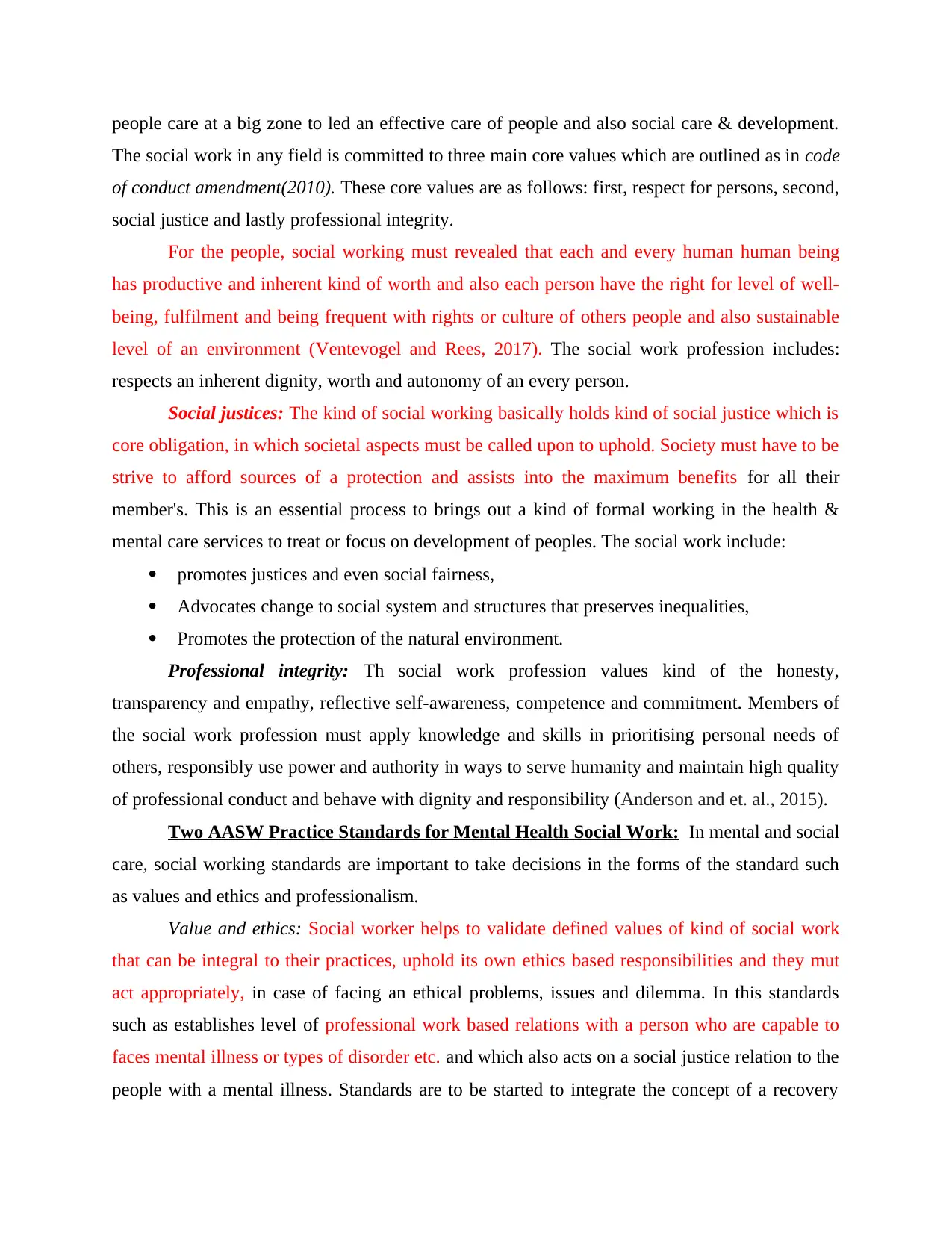
people care at a big zone to led an effective care of people and also social care & development.
The social work in any field is committed to three main core values which are outlined as in code
of conduct amendment(2010). These core values are as follows: first, respect for persons, second,
social justice and lastly professional integrity.
For the people, social working must revealed that each and every human human being
has productive and inherent kind of worth and also each person have the right for level of well-
being, fulfilment and being frequent with rights or culture of others people and also sustainable
level of an environment (Ventevogel and Rees, 2017). The social work profession includes:
respects an inherent dignity, worth and autonomy of an every person.
Social justices: The kind of social working basically holds kind of social justice which is
core obligation, in which societal aspects must be called upon to uphold. Society must have to be
strive to afford sources of a protection and assists into the maximum benefits for all their
member's. This is an essential process to brings out a kind of formal working in the health &
mental care services to treat or focus on development of peoples. The social work include:
promotes justices and even social fairness,
Advocates change to social system and structures that preserves inequalities,
Promotes the protection of the natural environment.
Professional integrity: Th social work profession values kind of the honesty,
transparency and empathy, reflective self-awareness, competence and commitment. Members of
the social work profession must apply knowledge and skills in prioritising personal needs of
others, responsibly use power and authority in ways to serve humanity and maintain high quality
of professional conduct and behave with dignity and responsibility (Anderson and et. al., 2015).
Two AASW Practice Standards for Mental Health Social Work: In mental and social
care, social working standards are important to take decisions in the forms of the standard such
as values and ethics and professionalism.
Value and ethics: Social worker helps to validate defined values of kind of social work
that can be integral to their practices, uphold its own ethics based responsibilities and they mut
act appropriately, in case of facing an ethical problems, issues and dilemma. In this standards
such as establishes level of professional work based relations with a person who are capable to
faces mental illness or types of disorder etc. and which also acts on a social justice relation to the
people with a mental illness. Standards are to be started to integrate the concept of a recovery
The social work in any field is committed to three main core values which are outlined as in code
of conduct amendment(2010). These core values are as follows: first, respect for persons, second,
social justice and lastly professional integrity.
For the people, social working must revealed that each and every human human being
has productive and inherent kind of worth and also each person have the right for level of well-
being, fulfilment and being frequent with rights or culture of others people and also sustainable
level of an environment (Ventevogel and Rees, 2017). The social work profession includes:
respects an inherent dignity, worth and autonomy of an every person.
Social justices: The kind of social working basically holds kind of social justice which is
core obligation, in which societal aspects must be called upon to uphold. Society must have to be
strive to afford sources of a protection and assists into the maximum benefits for all their
member's. This is an essential process to brings out a kind of formal working in the health &
mental care services to treat or focus on development of peoples. The social work include:
promotes justices and even social fairness,
Advocates change to social system and structures that preserves inequalities,
Promotes the protection of the natural environment.
Professional integrity: Th social work profession values kind of the honesty,
transparency and empathy, reflective self-awareness, competence and commitment. Members of
the social work profession must apply knowledge and skills in prioritising personal needs of
others, responsibly use power and authority in ways to serve humanity and maintain high quality
of professional conduct and behave with dignity and responsibility (Anderson and et. al., 2015).
Two AASW Practice Standards for Mental Health Social Work: In mental and social
care, social working standards are important to take decisions in the forms of the standard such
as values and ethics and professionalism.
Value and ethics: Social worker helps to validate defined values of kind of social work
that can be integral to their practices, uphold its own ethics based responsibilities and they mut
act appropriately, in case of facing an ethical problems, issues and dilemma. In this standards
such as establishes level of professional work based relations with a person who are capable to
faces mental illness or types of disorder etc. and which also acts on a social justice relation to the
people with a mental illness. Standards are to be started to integrate the concept of a recovery
Paraphrase This Document
Need a fresh take? Get an instant paraphrase of this document with our AI Paraphraser
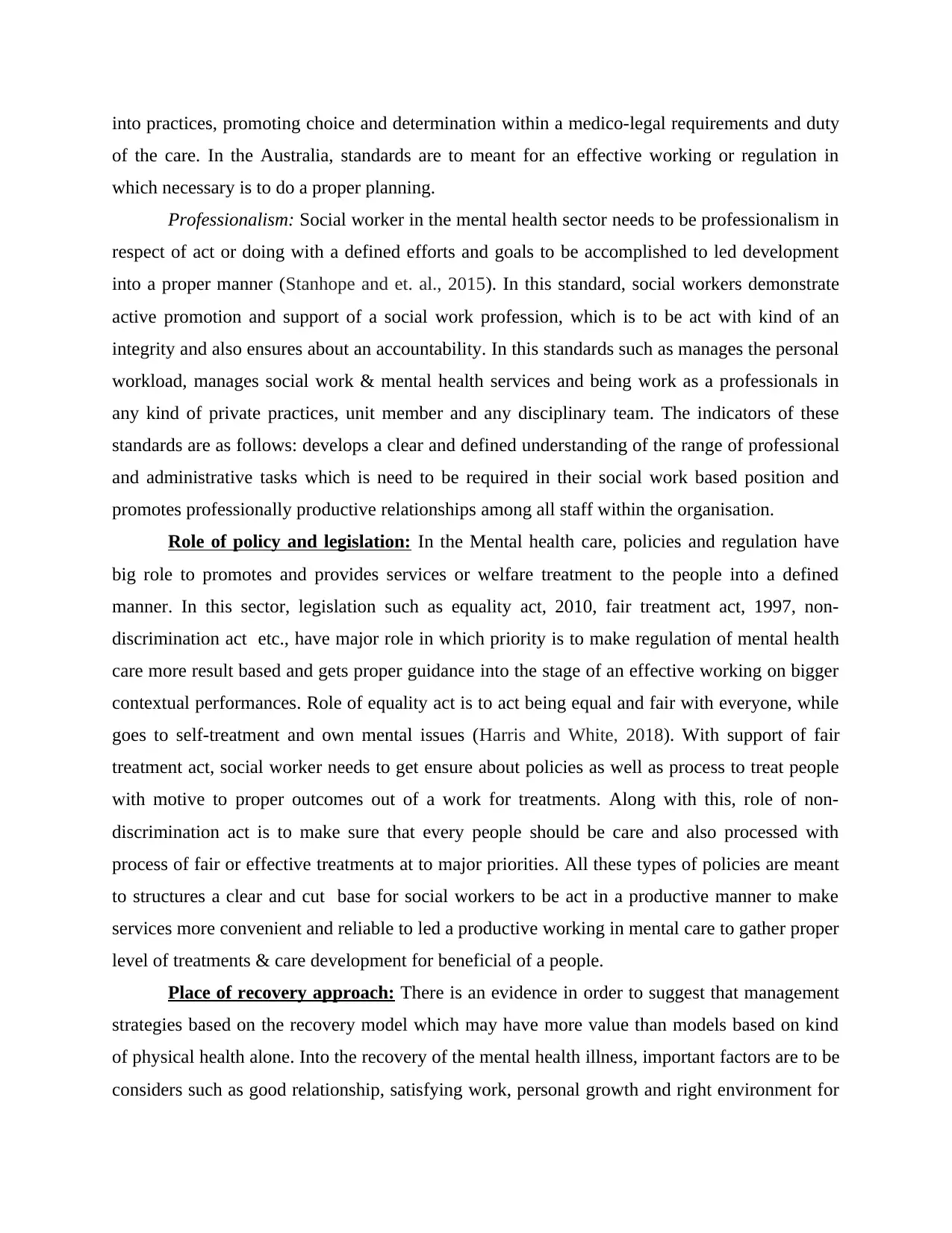
into practices, promoting choice and determination within a medico-legal requirements and duty
of the care. In the Australia, standards are to meant for an effective working or regulation in
which necessary is to do a proper planning.
Professionalism: Social worker in the mental health sector needs to be professionalism in
respect of act or doing with a defined efforts and goals to be accomplished to led development
into a proper manner (Stanhope and et. al., 2015). In this standard, social workers demonstrate
active promotion and support of a social work profession, which is to be act with kind of an
integrity and also ensures about an accountability. In this standards such as manages the personal
workload, manages social work & mental health services and being work as a professionals in
any kind of private practices, unit member and any disciplinary team. The indicators of these
standards are as follows: develops a clear and defined understanding of the range of professional
and administrative tasks which is need to be required in their social work based position and
promotes professionally productive relationships among all staff within the organisation.
Role of policy and legislation: In the Mental health care, policies and regulation have
big role to promotes and provides services or welfare treatment to the people into a defined
manner. In this sector, legislation such as equality act, 2010, fair treatment act, 1997, non-
discrimination act etc., have major role in which priority is to make regulation of mental health
care more result based and gets proper guidance into the stage of an effective working on bigger
contextual performances. Role of equality act is to act being equal and fair with everyone, while
goes to self-treatment and own mental issues (Harris and White, 2018). With support of fair
treatment act, social worker needs to get ensure about policies as well as process to treat people
with motive to proper outcomes out of a work for treatments. Along with this, role of non-
discrimination act is to make sure that every people should be care and also processed with
process of fair or effective treatments at to major priorities. All these types of policies are meant
to structures a clear and cut base for social workers to be act in a productive manner to make
services more convenient and reliable to led a productive working in mental care to gather proper
level of treatments & care development for beneficial of a people.
Place of recovery approach: There is an evidence in order to suggest that management
strategies based on the recovery model which may have more value than models based on kind
of physical health alone. Into the recovery of the mental health illness, important factors are to be
considers such as good relationship, satisfying work, personal growth and right environment for
of the care. In the Australia, standards are to meant for an effective working or regulation in
which necessary is to do a proper planning.
Professionalism: Social worker in the mental health sector needs to be professionalism in
respect of act or doing with a defined efforts and goals to be accomplished to led development
into a proper manner (Stanhope and et. al., 2015). In this standard, social workers demonstrate
active promotion and support of a social work profession, which is to be act with kind of an
integrity and also ensures about an accountability. In this standards such as manages the personal
workload, manages social work & mental health services and being work as a professionals in
any kind of private practices, unit member and any disciplinary team. The indicators of these
standards are as follows: develops a clear and defined understanding of the range of professional
and administrative tasks which is need to be required in their social work based position and
promotes professionally productive relationships among all staff within the organisation.
Role of policy and legislation: In the Mental health care, policies and regulation have
big role to promotes and provides services or welfare treatment to the people into a defined
manner. In this sector, legislation such as equality act, 2010, fair treatment act, 1997, non-
discrimination act etc., have major role in which priority is to make regulation of mental health
care more result based and gets proper guidance into the stage of an effective working on bigger
contextual performances. Role of equality act is to act being equal and fair with everyone, while
goes to self-treatment and own mental issues (Harris and White, 2018). With support of fair
treatment act, social worker needs to get ensure about policies as well as process to treat people
with motive to proper outcomes out of a work for treatments. Along with this, role of non-
discrimination act is to make sure that every people should be care and also processed with
process of fair or effective treatments at to major priorities. All these types of policies are meant
to structures a clear and cut base for social workers to be act in a productive manner to make
services more convenient and reliable to led a productive working in mental care to gather proper
level of treatments & care development for beneficial of a people.
Place of recovery approach: There is an evidence in order to suggest that management
strategies based on the recovery model which may have more value than models based on kind
of physical health alone. Into the recovery of the mental health illness, important factors are to be
considers such as good relationship, satisfying work, personal growth and right environment for
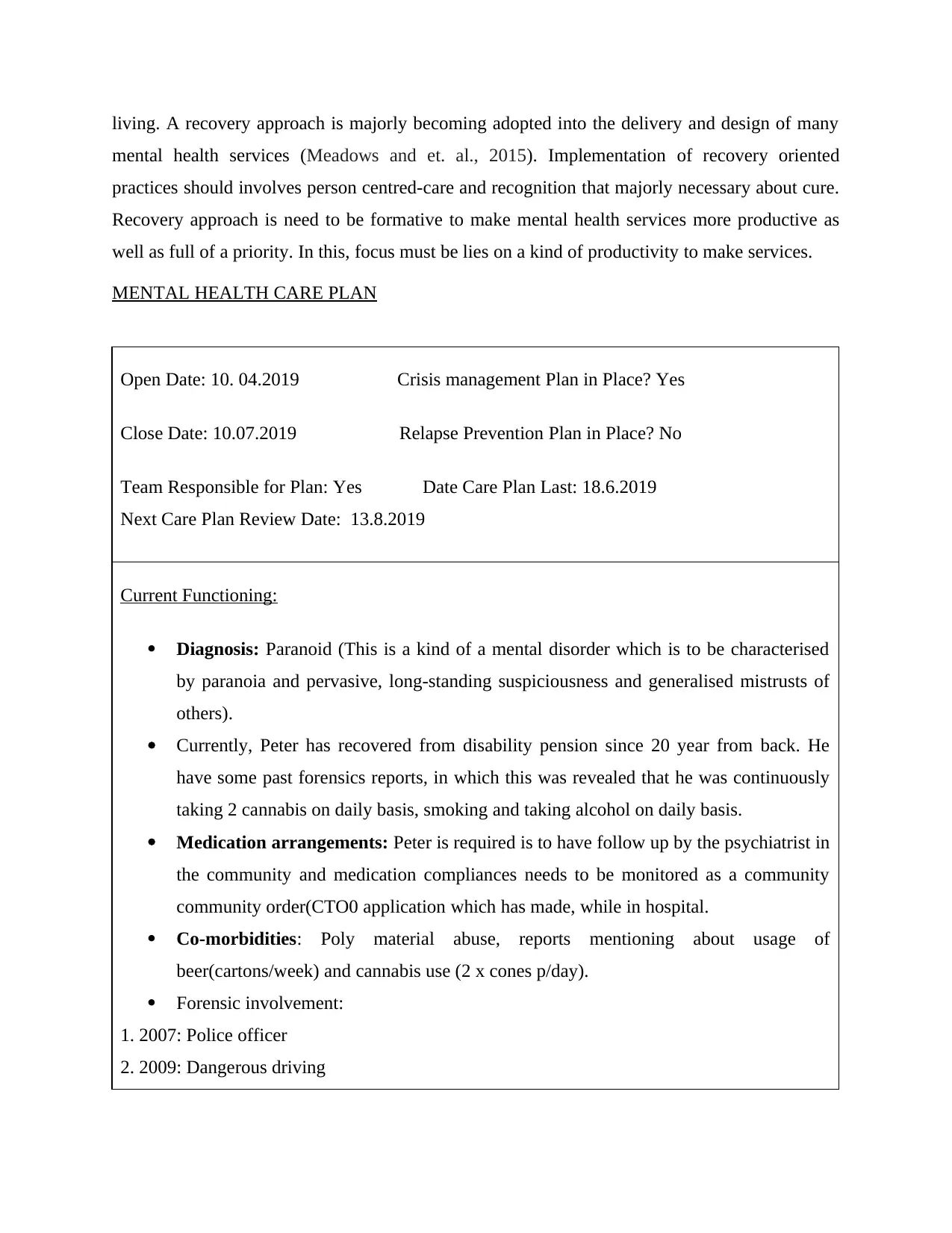
living. A recovery approach is majorly becoming adopted into the delivery and design of many
mental health services (Meadows and et. al., 2015). Implementation of recovery oriented
practices should involves person centred-care and recognition that majorly necessary about cure.
Recovery approach is need to be formative to make mental health services more productive as
well as full of a priority. In this, focus must be lies on a kind of productivity to make services.
MENTAL HEALTH CARE PLAN
Open Date: 10. 04.2019 Crisis management Plan in Place? Yes
Close Date: 10.07.2019 Relapse Prevention Plan in Place? No
Team Responsible for Plan: Yes Date Care Plan Last: 18.6.2019
Next Care Plan Review Date: 13.8.2019
Current Functioning:
Diagnosis: Paranoid (This is a kind of a mental disorder which is to be characterised
by paranoia and pervasive, long-standing suspiciousness and generalised mistrusts of
others).
Currently, Peter has recovered from disability pension since 20 year from back. He
have some past forensics reports, in which this was revealed that he was continuously
taking 2 cannabis on daily basis, smoking and taking alcohol on daily basis.
Medication arrangements: Peter is required is to have follow up by the psychiatrist in
the community and medication compliances needs to be monitored as a community
community order(CTO0 application which has made, while in hospital.
Co-morbidities: Poly material abuse, reports mentioning about usage of
beer(cartons/week) and cannabis use (2 x cones p/day).
Forensic involvement:
1. 2007: Police officer
2. 2009: Dangerous driving
mental health services (Meadows and et. al., 2015). Implementation of recovery oriented
practices should involves person centred-care and recognition that majorly necessary about cure.
Recovery approach is need to be formative to make mental health services more productive as
well as full of a priority. In this, focus must be lies on a kind of productivity to make services.
MENTAL HEALTH CARE PLAN
Open Date: 10. 04.2019 Crisis management Plan in Place? Yes
Close Date: 10.07.2019 Relapse Prevention Plan in Place? No
Team Responsible for Plan: Yes Date Care Plan Last: 18.6.2019
Next Care Plan Review Date: 13.8.2019
Current Functioning:
Diagnosis: Paranoid (This is a kind of a mental disorder which is to be characterised
by paranoia and pervasive, long-standing suspiciousness and generalised mistrusts of
others).
Currently, Peter has recovered from disability pension since 20 year from back. He
have some past forensics reports, in which this was revealed that he was continuously
taking 2 cannabis on daily basis, smoking and taking alcohol on daily basis.
Medication arrangements: Peter is required is to have follow up by the psychiatrist in
the community and medication compliances needs to be monitored as a community
community order(CTO0 application which has made, while in hospital.
Co-morbidities: Poly material abuse, reports mentioning about usage of
beer(cartons/week) and cannabis use (2 x cones p/day).
Forensic involvement:
1. 2007: Police officer
2. 2009: Dangerous driving
⊘ This is a preview!⊘
Do you want full access?
Subscribe today to unlock all pages.

Trusted by 1+ million students worldwide
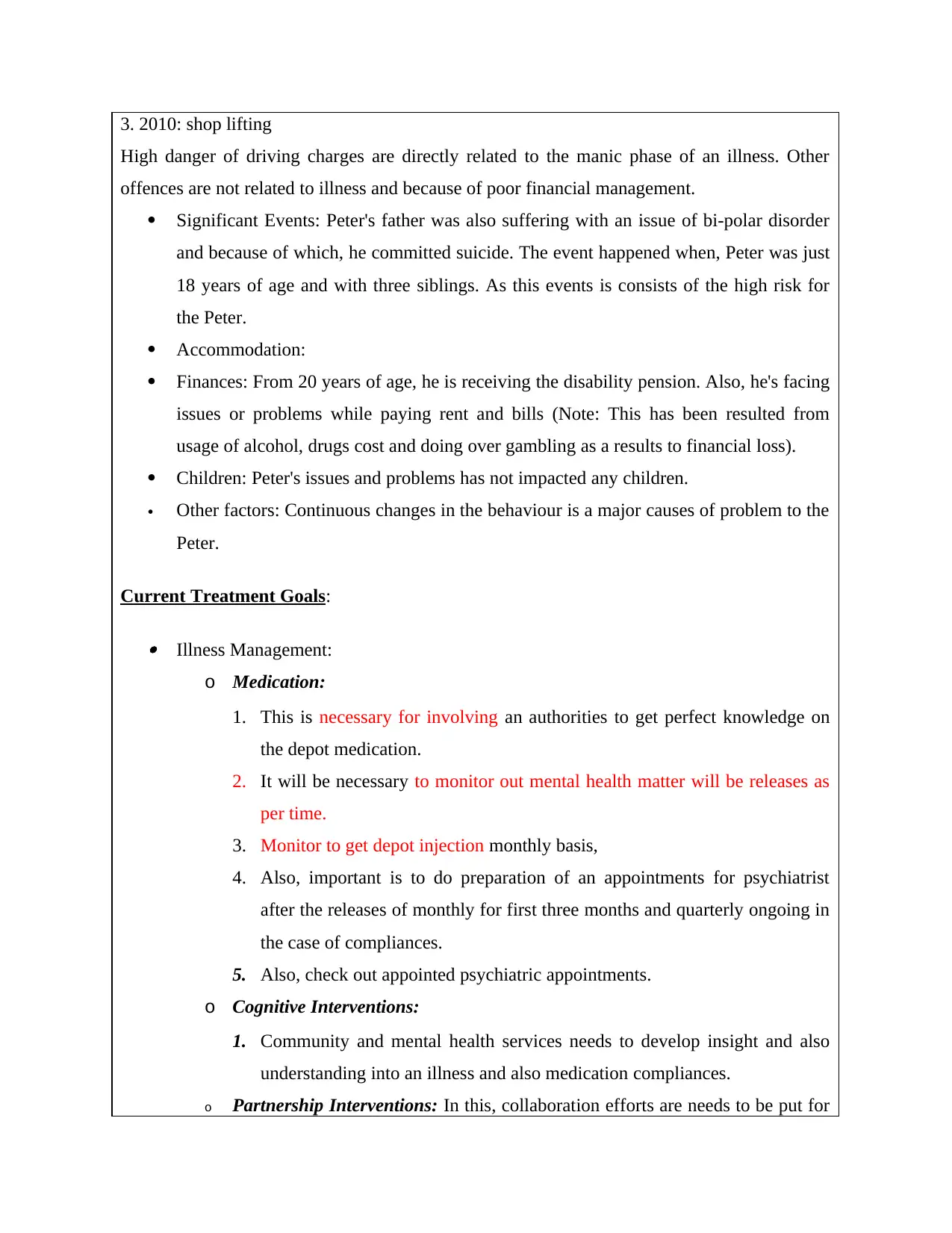
3. 2010: shop lifting
High danger of driving charges are directly related to the manic phase of an illness. Other
offences are not related to illness and because of poor financial management.
Significant Events: Peter's father was also suffering with an issue of bi-polar disorder
and because of which, he committed suicide. The event happened when, Peter was just
18 years of age and with three siblings. As this events is consists of the high risk for
the Peter.
Accommodation:
Finances: From 20 years of age, he is receiving the disability pension. Also, he's facing
issues or problems while paying rent and bills (Note: This has been resulted from
usage of alcohol, drugs cost and doing over gambling as a results to financial loss).
Children: Peter's issues and problems has not impacted any children.
Other factors: Continuous changes in the behaviour is a major causes of problem to the
Peter.
Current Treatment Goals:
Illness Management:
o Medication:
1. This is necessary for involving an authorities to get perfect knowledge on
the depot medication.
2. It will be necessary to monitor out mental health matter will be releases as
per time.
3. Monitor to get depot injection monthly basis,
4. Also, important is to do preparation of an appointments for psychiatrist
after the releases of monthly for first three months and quarterly ongoing in
the case of compliances.
5. Also, check out appointed psychiatric appointments.
o Cognitive Interventions:
1. Community and mental health services needs to develop insight and also
understanding into an illness and also medication compliances.
o Partnership Interventions: In this, collaboration efforts are needs to be put for
High danger of driving charges are directly related to the manic phase of an illness. Other
offences are not related to illness and because of poor financial management.
Significant Events: Peter's father was also suffering with an issue of bi-polar disorder
and because of which, he committed suicide. The event happened when, Peter was just
18 years of age and with three siblings. As this events is consists of the high risk for
the Peter.
Accommodation:
Finances: From 20 years of age, he is receiving the disability pension. Also, he's facing
issues or problems while paying rent and bills (Note: This has been resulted from
usage of alcohol, drugs cost and doing over gambling as a results to financial loss).
Children: Peter's issues and problems has not impacted any children.
Other factors: Continuous changes in the behaviour is a major causes of problem to the
Peter.
Current Treatment Goals:
Illness Management:
o Medication:
1. This is necessary for involving an authorities to get perfect knowledge on
the depot medication.
2. It will be necessary to monitor out mental health matter will be releases as
per time.
3. Monitor to get depot injection monthly basis,
4. Also, important is to do preparation of an appointments for psychiatrist
after the releases of monthly for first three months and quarterly ongoing in
the case of compliances.
5. Also, check out appointed psychiatric appointments.
o Cognitive Interventions:
1. Community and mental health services needs to develop insight and also
understanding into an illness and also medication compliances.
o Partnership Interventions: In this, collaboration efforts are needs to be put for
Paraphrase This Document
Need a fresh take? Get an instant paraphrase of this document with our AI Paraphraser
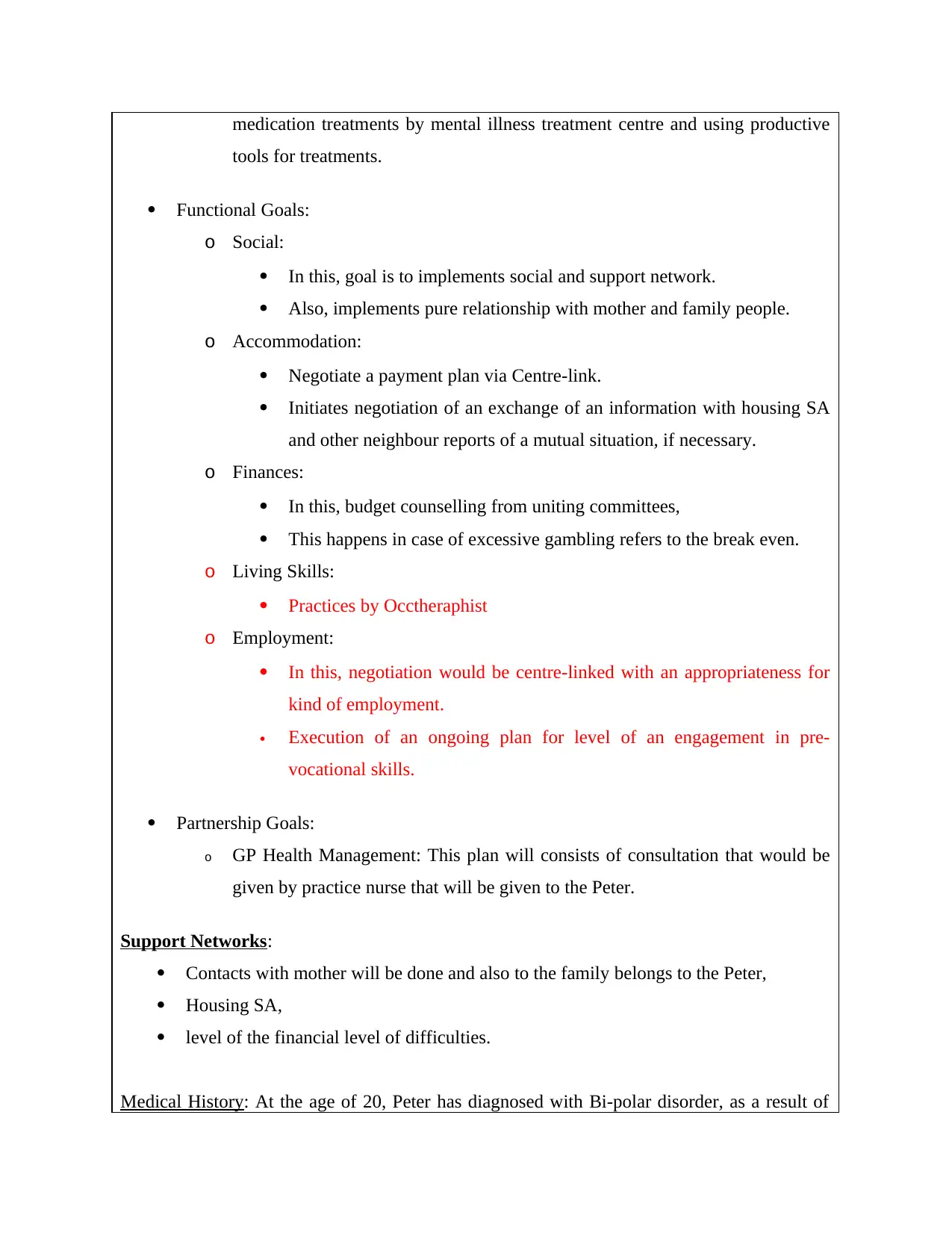
medication treatments by mental illness treatment centre and using productive
tools for treatments.
Functional Goals:
o Social:
In this, goal is to implements social and support network.
Also, implements pure relationship with mother and family people.
o Accommodation:
Negotiate a payment plan via Centre-link.
Initiates negotiation of an exchange of an information with housing SA
and other neighbour reports of a mutual situation, if necessary.
o Finances:
In this, budget counselling from uniting committees,
This happens in case of excessive gambling refers to the break even.
o Living Skills:
Practices by Occtheraphist
o Employment:
In this, negotiation would be centre-linked with an appropriateness for
kind of employment.
Execution of an ongoing plan for level of an engagement in pre-
vocational skills.
Partnership Goals:
o GP Health Management: This plan will consists of consultation that would be
given by practice nurse that will be given to the Peter.
Support Networks:
Contacts with mother will be done and also to the family belongs to the Peter,
Housing SA,
level of the financial level of difficulties.
Medical History: At the age of 20, Peter has diagnosed with Bi-polar disorder, as a result of
tools for treatments.
Functional Goals:
o Social:
In this, goal is to implements social and support network.
Also, implements pure relationship with mother and family people.
o Accommodation:
Negotiate a payment plan via Centre-link.
Initiates negotiation of an exchange of an information with housing SA
and other neighbour reports of a mutual situation, if necessary.
o Finances:
In this, budget counselling from uniting committees,
This happens in case of excessive gambling refers to the break even.
o Living Skills:
Practices by Occtheraphist
o Employment:
In this, negotiation would be centre-linked with an appropriateness for
kind of employment.
Execution of an ongoing plan for level of an engagement in pre-
vocational skills.
Partnership Goals:
o GP Health Management: This plan will consists of consultation that would be
given by practice nurse that will be given to the Peter.
Support Networks:
Contacts with mother will be done and also to the family belongs to the Peter,
Housing SA,
level of the financial level of difficulties.
Medical History: At the age of 20, Peter has diagnosed with Bi-polar disorder, as a result of
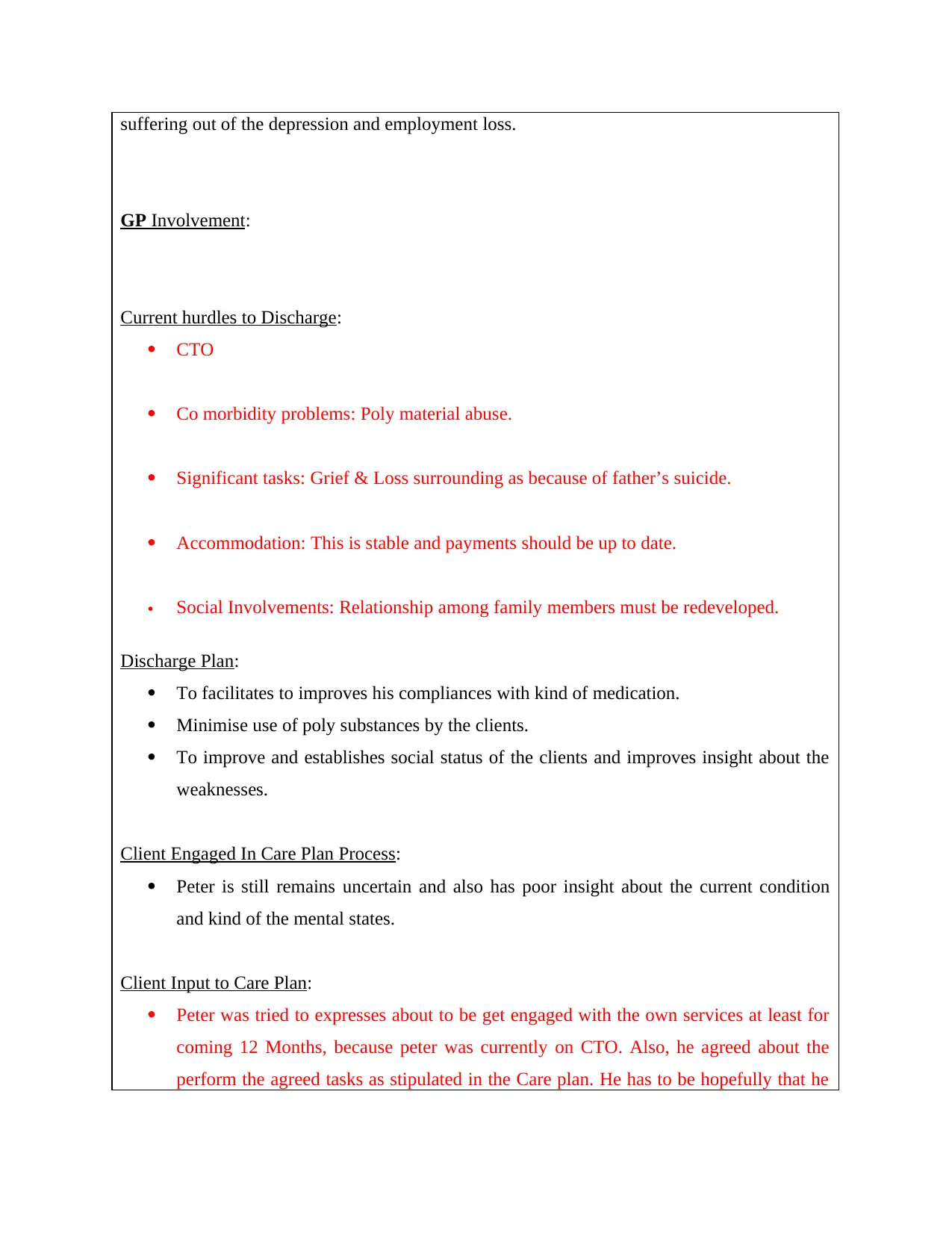
suffering out of the depression and employment loss.
GP Involvement:
Current hurdles to Discharge:
CTO
Co morbidity problems: Poly material abuse.
Significant tasks: Grief & Loss surrounding as because of father’s suicide.
Accommodation: This is stable and payments should be up to date.
Social Involvements: Relationship among family members must be redeveloped.
Discharge Plan:
To facilitates to improves his compliances with kind of medication.
Minimise use of poly substances by the clients.
To improve and establishes social status of the clients and improves insight about the
weaknesses.
Client Engaged In Care Plan Process:
Peter is still remains uncertain and also has poor insight about the current condition
and kind of the mental states.
Client Input to Care Plan:
Peter was tried to expresses about to be get engaged with the own services at least for
coming 12 Months, because peter was currently on CTO. Also, he agreed about the
perform the agreed tasks as stipulated in the Care plan. He has to be hopefully that he
GP Involvement:
Current hurdles to Discharge:
CTO
Co morbidity problems: Poly material abuse.
Significant tasks: Grief & Loss surrounding as because of father’s suicide.
Accommodation: This is stable and payments should be up to date.
Social Involvements: Relationship among family members must be redeveloped.
Discharge Plan:
To facilitates to improves his compliances with kind of medication.
Minimise use of poly substances by the clients.
To improve and establishes social status of the clients and improves insight about the
weaknesses.
Client Engaged In Care Plan Process:
Peter is still remains uncertain and also has poor insight about the current condition
and kind of the mental states.
Client Input to Care Plan:
Peter was tried to expresses about to be get engaged with the own services at least for
coming 12 Months, because peter was currently on CTO. Also, he agreed about the
perform the agreed tasks as stipulated in the Care plan. He has to be hopefully that he
⊘ This is a preview!⊘
Do you want full access?
Subscribe today to unlock all pages.

Trusted by 1+ million students worldwide
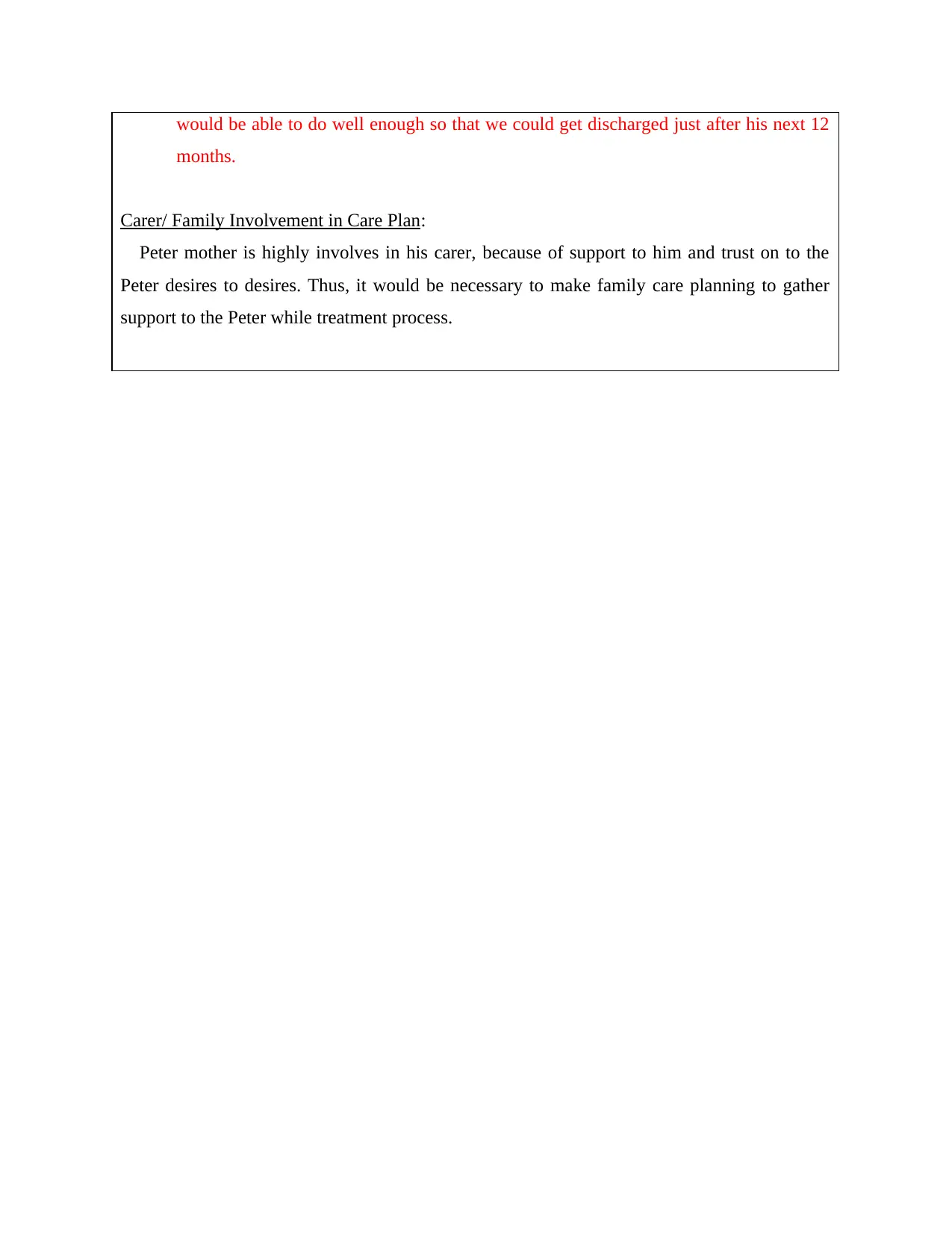
would be able to do well enough so that we could get discharged just after his next 12
months.
Carer/ Family Involvement in Care Plan:
Peter mother is highly involves in his carer, because of support to him and trust on to the
Peter desires to desires. Thus, it would be necessary to make family care planning to gather
support to the Peter while treatment process.
months.
Carer/ Family Involvement in Care Plan:
Peter mother is highly involves in his carer, because of support to him and trust on to the
Peter desires to desires. Thus, it would be necessary to make family care planning to gather
support to the Peter while treatment process.
Paraphrase This Document
Need a fresh take? Get an instant paraphrase of this document with our AI Paraphraser
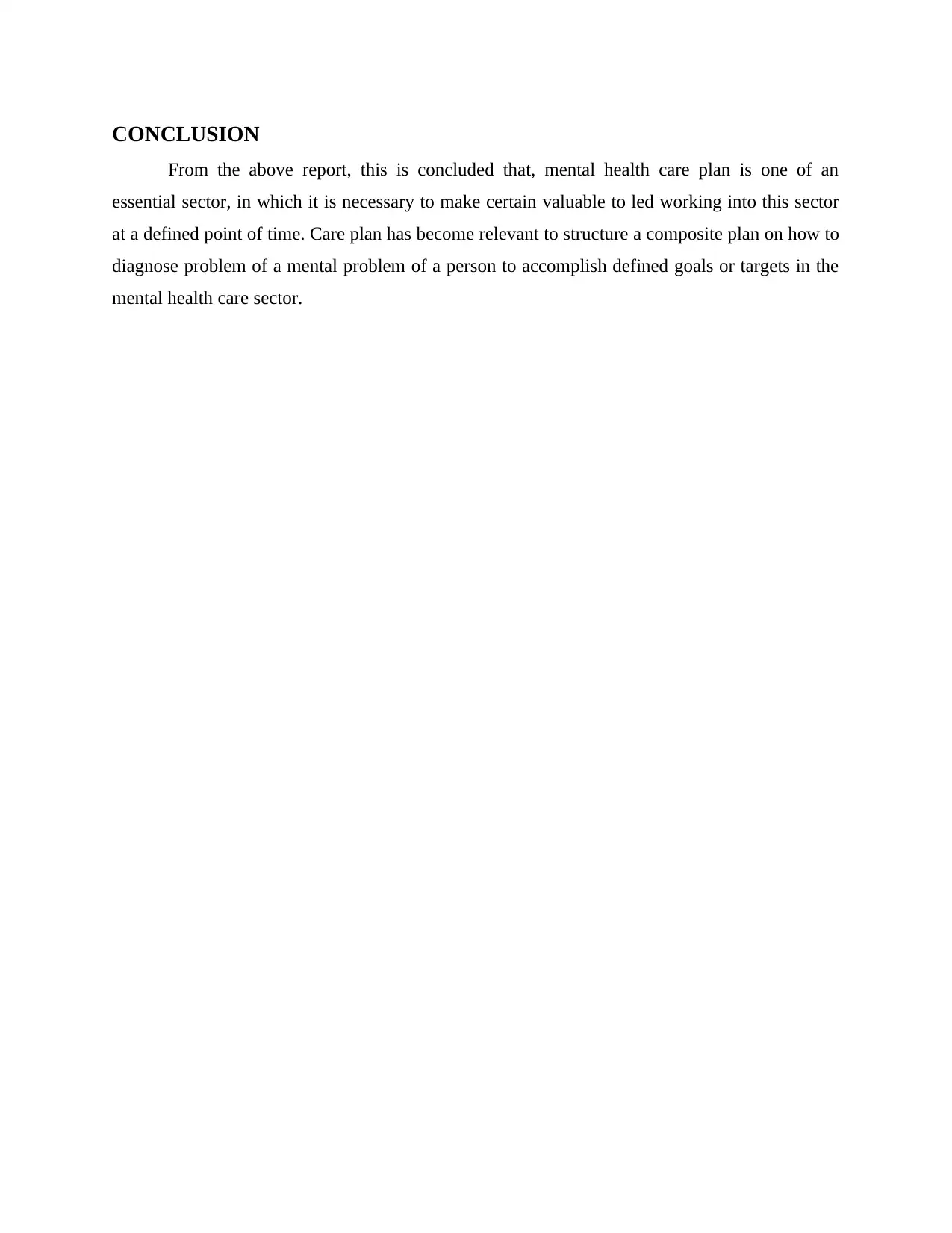
CONCLUSION
From the above report, this is concluded that, mental health care plan is one of an
essential sector, in which it is necessary to make certain valuable to led working into this sector
at a defined point of time. Care plan has become relevant to structure a composite plan on how to
diagnose problem of a mental problem of a person to accomplish defined goals or targets in the
mental health care sector.
From the above report, this is concluded that, mental health care plan is one of an
essential sector, in which it is necessary to make certain valuable to led working into this sector
at a defined point of time. Care plan has become relevant to structure a composite plan on how to
diagnose problem of a mental problem of a person to accomplish defined goals or targets in the
mental health care sector.
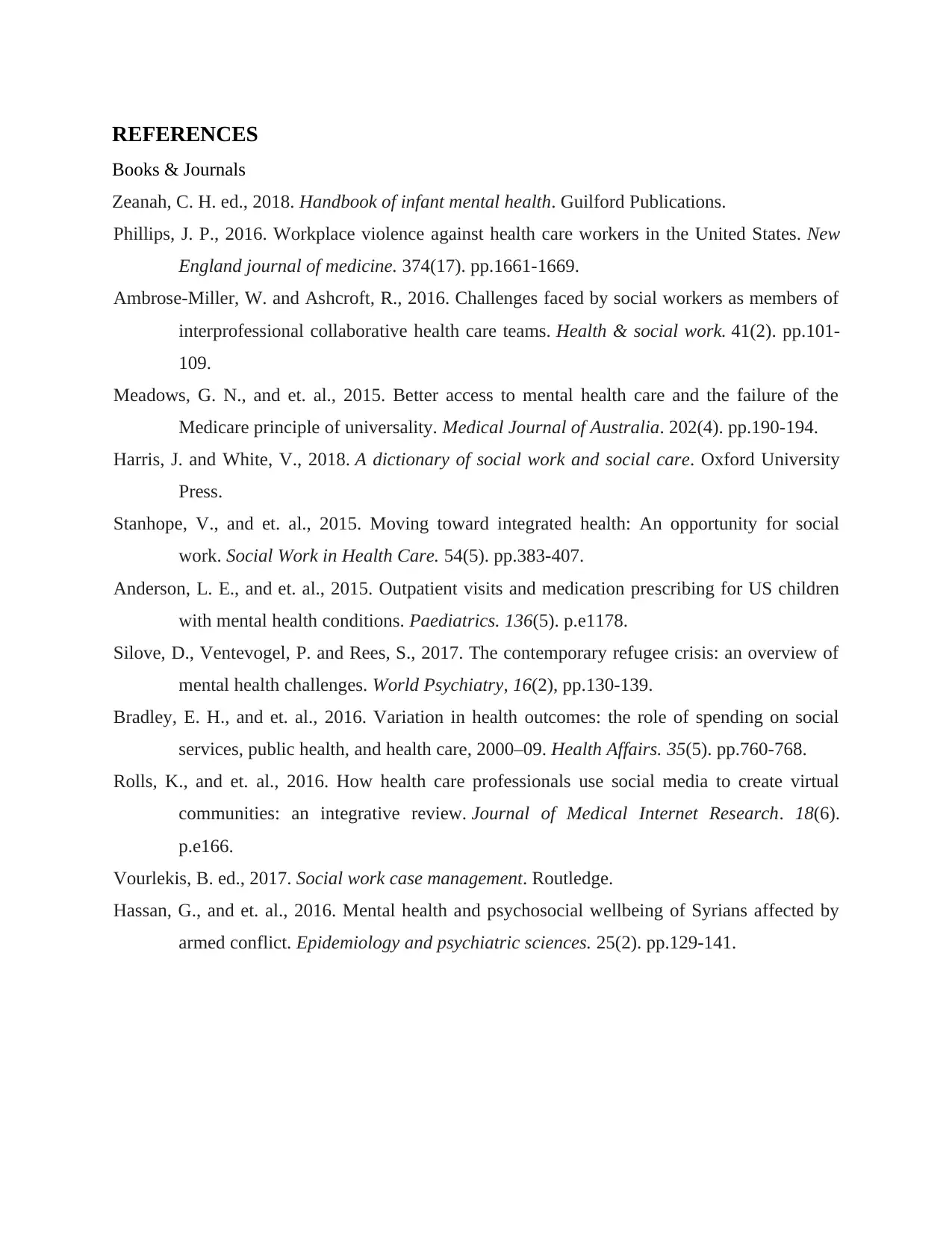
REFERENCES
Books & Journals
Zeanah, C. H. ed., 2018. Handbook of infant mental health. Guilford Publications.
Phillips, J. P., 2016. Workplace violence against health care workers in the United States. New
England journal of medicine. 374(17). pp.1661-1669.
Ambrose-Miller, W. and Ashcroft, R., 2016. Challenges faced by social workers as members of
interprofessional collaborative health care teams. Health & social work. 41(2). pp.101-
109.
Meadows, G. N., and et. al., 2015. Better access to mental health care and the failure of the
Medicare principle of universality. Medical Journal of Australia. 202(4). pp.190-194.
Harris, J. and White, V., 2018. A dictionary of social work and social care. Oxford University
Press.
Stanhope, V., and et. al., 2015. Moving toward integrated health: An opportunity for social
work. Social Work in Health Care. 54(5). pp.383-407.
Anderson, L. E., and et. al., 2015. Outpatient visits and medication prescribing for US children
with mental health conditions. Paediatrics. 136(5). p.e1178.
Silove, D., Ventevogel, P. and Rees, S., 2017. The contemporary refugee crisis: an overview of
mental health challenges. World Psychiatry, 16(2), pp.130-139.
Bradley, E. H., and et. al., 2016. Variation in health outcomes: the role of spending on social
services, public health, and health care, 2000–09. Health Affairs. 35(5). pp.760-768.
Rolls, K., and et. al., 2016. How health care professionals use social media to create virtual
communities: an integrative review. Journal of Medical Internet Research. 18(6).
p.e166.
Vourlekis, B. ed., 2017. Social work case management. Routledge.
Hassan, G., and et. al., 2016. Mental health and psychosocial wellbeing of Syrians affected by
armed conflict. Epidemiology and psychiatric sciences. 25(2). pp.129-141.
Books & Journals
Zeanah, C. H. ed., 2018. Handbook of infant mental health. Guilford Publications.
Phillips, J. P., 2016. Workplace violence against health care workers in the United States. New
England journal of medicine. 374(17). pp.1661-1669.
Ambrose-Miller, W. and Ashcroft, R., 2016. Challenges faced by social workers as members of
interprofessional collaborative health care teams. Health & social work. 41(2). pp.101-
109.
Meadows, G. N., and et. al., 2015. Better access to mental health care and the failure of the
Medicare principle of universality. Medical Journal of Australia. 202(4). pp.190-194.
Harris, J. and White, V., 2018. A dictionary of social work and social care. Oxford University
Press.
Stanhope, V., and et. al., 2015. Moving toward integrated health: An opportunity for social
work. Social Work in Health Care. 54(5). pp.383-407.
Anderson, L. E., and et. al., 2015. Outpatient visits and medication prescribing for US children
with mental health conditions. Paediatrics. 136(5). p.e1178.
Silove, D., Ventevogel, P. and Rees, S., 2017. The contemporary refugee crisis: an overview of
mental health challenges. World Psychiatry, 16(2), pp.130-139.
Bradley, E. H., and et. al., 2016. Variation in health outcomes: the role of spending on social
services, public health, and health care, 2000–09. Health Affairs. 35(5). pp.760-768.
Rolls, K., and et. al., 2016. How health care professionals use social media to create virtual
communities: an integrative review. Journal of Medical Internet Research. 18(6).
p.e166.
Vourlekis, B. ed., 2017. Social work case management. Routledge.
Hassan, G., and et. al., 2016. Mental health and psychosocial wellbeing of Syrians affected by
armed conflict. Epidemiology and psychiatric sciences. 25(2). pp.129-141.
⊘ This is a preview!⊘
Do you want full access?
Subscribe today to unlock all pages.

Trusted by 1+ million students worldwide
1 out of 12
Related Documents
Your All-in-One AI-Powered Toolkit for Academic Success.
+13062052269
info@desklib.com
Available 24*7 on WhatsApp / Email
![[object Object]](/_next/static/media/star-bottom.7253800d.svg)
Unlock your academic potential
Copyright © 2020–2026 A2Z Services. All Rights Reserved. Developed and managed by ZUCOL.





